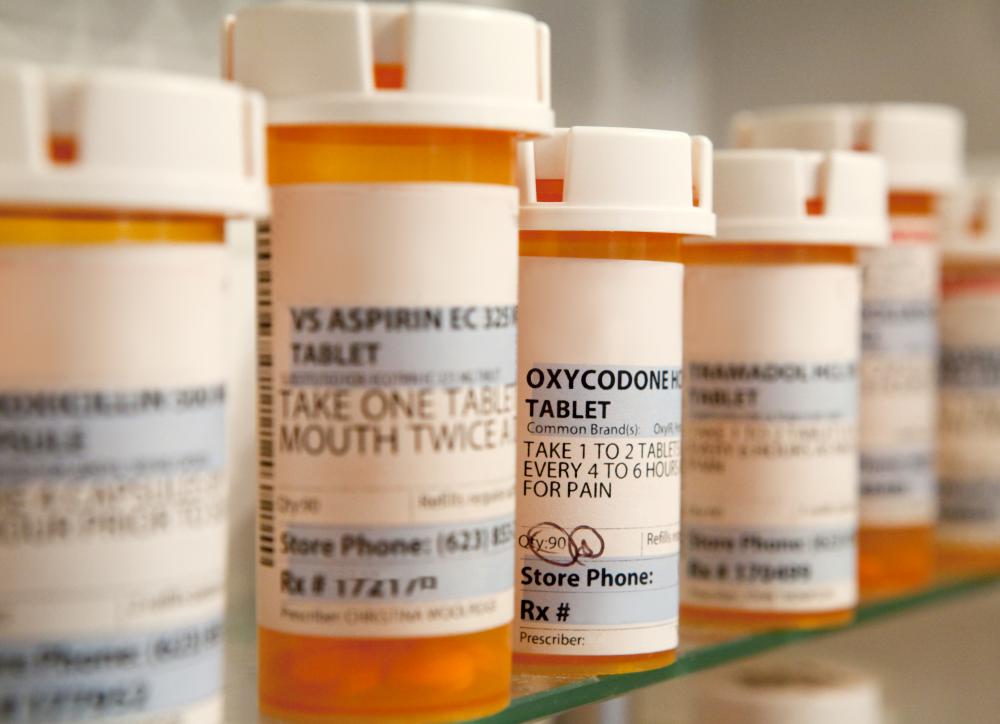At WiseGEEK, we're committed to delivering accurate, trustworthy information. Our expert-authored content is rigorously fact-checked and sourced from credible authorities. Discover how we uphold the highest standards in providing you with reliable knowledge.
What are the Symptoms of Oxycodone Withdrawal?
Oxycodone withdrawal symptoms may occur when people stop taking oxycodone hydrochloride, an effective, but addictive, opioid pain reliever that is usually only available by prescription. Specific symptoms tend to vary by the individual and also depend on length of dependency. Abrupt withdrawal by long-term users is usually associated with highest number of unpleasant and difficult symptoms, while people who take the drug for a brief period without establishing dependency may not experience any symptoms at all when stopping. Physicians need to take care that tapering of the drug occurs when it has been used for a long time, and if the drug has been taken illegally, people may need medical support to discontinue it without encountering severe withdrawal symptoms.
There are many different ways that oxycodone withdrawal may be evident to a person who has suddenly stopped taking the medicine. Some of the symptoms that can be associated with withdrawal include different types of stomach upset. People may have poor appetite, severe bouts of diarrhea, nausea and/or vomiting, or a stomachache. A number of folks feel like they have not only stomach but seasonal flu, and the skin could feel clammy or crawling skin, aches and pains might affect the joints and the muscles, or people might run a fever.

Additional oxycodone withdrawal symptoms include excess sweating, insomnia or disturbances while asleep (parasomnias), and nasal congestion. Some have more aggravated symptoms upon oxycodone withdrawal. The most severe of these may be experiencing visual, auditory or tactile hallucinations that can cause great fright or disorientation.
There isn’t a defined time of when oxycodone withdrawal completes itself. People who are only slightly dependent might note symptoms for a day or two. Those who have taken the drug for a long time may experience withdrawal symptoms to a certain degree for several weeks or even months. Getting through this experience can be extraordinarily difficult, especially when people don’t have adequate support.

Perhaps the best way to get assistance during oxycodone withdrawal is to ask for help from the prescribing physician. The physician and patient can come up with a method of tapering that allows patients to gradually reduce dependency on the drug. This same method is not always useful to those who have been using the drug without a prescription. In these cases, help from a drug treatment center may be of most use in alleviating some of the discomfort of withdrawal and in providing support to end an addiction to an illegal substance.
AS FEATURED ON:
AS FEATURED ON:
















Discussion Comments
Check with your doctor. Clonidine helps with the racing heart and chest pain. Wean down slowly, 20-25 percent per week, and get a friend to help you through the night. I know this is hard but towards the end take as much time off as you can.
Check valium takes the edge of anxiety off, and take a greens drink. The last is the hardest -- about 5-10 mg per day. It's time to cold turkey out and put up with one or two days of semi-hell. An antihistamine stops the runny eyes and ears, Good luck. Never give up!
@ysmina-- My brother was addicted to oxycodone and he was able to quit and get through the withdrawal symptoms with the help of Clonodine. You should ask your doctor about this drug.
He also said that vitamins helped a lot with the withdrawal symptoms. He was taking a multivitamin with potassium, magnesium, zinc and vitamin C as well as a vitamin B complex daily.
I think there is an opiate detox program at most detox centers. I'm sure it wouldn't hurt to try it.
@ysmina-- Not right now, but I have several times in the past and I know how difficult opiate withdrawal symptoms can be.
I understand that you don't have a psychological addiction, which is definitely different from a physical addiction. A psychological addiction will have some of the same physical withdrawal symptoms, in addition to longing for the drug after quitting.
I think your doctor needs to help you more by prescribing a cheaper, less-addictive pain-killer since you have a legitimate pain issue. You can speak to a support group or detox center for emotional support if you need to. But when you overcome the physical withdrawal symptoms and deal with your pain better, I don't think you will need it.
I've been on 90mg (per day) of oxycodone for the past year. My insurance has changed recently as I've changed my job and I'm now working part-time instead of full-time. The new insurance company won't cover the oxycodone and my doctor thinks it's time to wean me off.
I've already started doing that and have gone down to 50mg over the past week. I'm going through withdrawal with flu-like symptoms, some itchiness, difficulty sleeping and a lot of irritation/agitation. My pain is also starting to come back so I'm basically miserable right now and don't even want to get out of the house.
My doctor is not willing to prescribe a replacement pain killer for now and I really don't know how I'm going to deal with all these withdrawal symptoms on my own. Do you think I should go to a detox-program for addicts? I don't have a psychological addiction, just a physical one but I just don't feel that I can do this alone.
Anyone else going through opiate withdrawal right now?
Post your comments